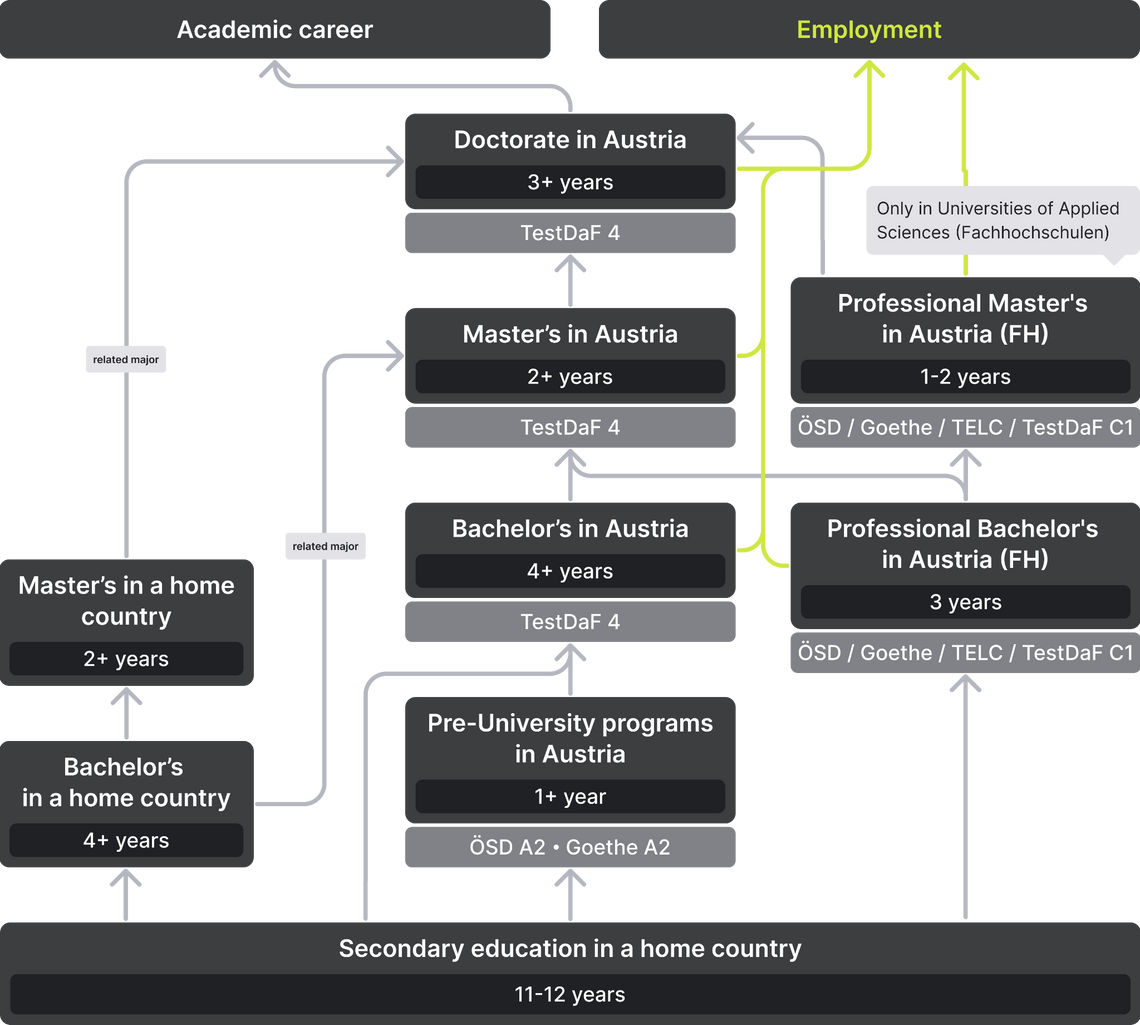Apply to a foreign university with confidence
- Properly fulfilled documents
- Perfect motivation letter
- Support from a personal mentor
- Offers from several universities
Article score: 4 out of 5 (2 reviews)
It is possible to enroll at Austrian universities after the 11th grade, despite the fact that education in the country lasts 12 years. However, if your knowledge does not meet the requirements of the chosen university, you may be asked to take supplementary exams or sent to preparatory courses. You will also have to confirm your language proficiency and pass entrance exams.
Free consultation





It is possible to enroll at Austrian universities after the 11th grade, despite the fact that education in the country lasts 12 years. However, if your knowledge does not meet the requirements of the chosen university, you may be asked to take supplementary exams or sent to preparatory courses. You will also have to confirm your language proficiency and pass entrance exams.
Keep reading for more information on admission requirements.
We discuss the features of the Austrian higher education system and universities in our separate articles.
| Program | Age | Duration | Min. cost per semester | Avg. cost per semester |
|---|---|---|---|---|
| University preparation | 17+ | 1-2 years | 1,435 USD | 4,068 USD/year |
| Bachelor's | 17+ | 3-4 years | 822 USD | 4,520 USD |
| Master's | 20+ | 1-2 years | 822 USD | 5,650 USD |
| MBA | 20+ | 1-2 years | 9,605 USD/year | 28,250 USD/year |
| PhD | 20+ | 3-4 years | 822 USD | 3,107 USD |
| Expense | Average cost |
|---|---|
| Student fee | 24 USD/semester |
| Registration fee | 56 USD |
| Visa | 169 USD |
| Residence permit | 181 USD |
| Rent | 678 USD/month |
| Hostel | 339 USD/month |
| Insurance | 73 USD/month |
| Meals | 282 USD/month |
| Public transportation | 56 USD/month |
Check the exact prices and requirements on the websites of universities.


When choosing a university, you should pay attention to several factors: the type of institution, quality of education, admission requirements, and tuition costs.
It is best to choose a university based on your goals and chosen field of study. Austria has:
World rankings help build a general picture of education in a country. However, this is not the most objective criterion when choosing a university. University rankings vary from case to case given that they consider different criteria.
For example, QS primarily assesses the reputation of a university in the academic environment. According to it, the top three universities in Austria are:
THE looks at the quality of education and research output of the university. The top places were taken by:
ARWU (Shanghai Ranking) evaluates only the research potential of the university. The presence of Nobel or Fields Prize winners and quality of scientific publications are important. If we consider the Shanghai ranking, then the first three places are taken by:
After you have read the world rankings, check out the subject rankings. This is a more important criterion. It shows where the university stands in a particular field. For example, the University of Vienna ranks 43rd in the arts and humanities[3]. The Vienna University of Technology is ranked 86th in engineering and technology[4]. In terms of medical education, the Medical University of Vienna (105 in the world) is the leader among Austrian universities[5].
At public universities, education for all programs costs 822 USD per month for students from outside the EU. At private universities, tuition is much higher — from 3,390 USD to 28,250 USD per year. And at universities of applied sciences, you will have to pay about 4,520-5,650 USD per semester.
Bachelor’s programs in Austria are entirely in German. There are very few universities in the country that offer programs in English. If you are definitely not going to learn German, you will have to choose another country for a bachelor's degree. Regarding master’s programs, half are in German, and the other half are in English.
UniPage specialists have been working with Austrian universities for many years. We help select universities and programs based on the capabilities and interests of our clients. We know everything about studying abroad and will not miss a single detail when preparing documents and writing a motivation letter.
Items 1-6 of 108
Advanced search
Despite the fact that secondary education in Austria lasts 12 years, you can enter any university after the 11th grade.
Austria does not have a uniform student admission system. Therefore, applicants apply directly to the chosen university. Each university may have its own requirements for applicants — verify them on their official websites.
The main language of instruction at Austrian universities is German. For admission to most universities, you should have a C1 level of proficiency (less often — B2). Universities of the arts accept Intermediate (B1) level students. You can confirm your language proficiency with the ÖSD Zertifikat, Goethe Zertifikat, or TestDaF.
At some universities, you can even enroll with an A2 level. This is possible if the university has a Vorstudienlehrgänge from OeAD. In these courses, students work towards the required C1 level.
There are also English-language programs, but not for bachelor's study. English is common in master's and PhD programs, especially in business, management, marketing, and information technology. The minimum required level of English proficiency is IELTS 6.0 (for some fields — 6.5).
Since 2019, Austrian universities have begun to introduce entrance examinations. They are more common at medical and applied universities in the form of tests, and at art universities in the form of portfolio assessments and auditions. But at ordinary institutions, you need to pass entrance tests for some specialties.
Be sure to specify the exact dates for submitting applications and passing exams. Because of the entrance tests, admission to such programs may take place earlier, and not in the general application wave.
Austria adopted the 1961 Hague Convention on Simplified Legalization of Documents. If your country is in the list, an apostille is required. After apostilling, the document must be translated into German and notarized.
In Austria, university preparatory programs are organized by the OeAD. These courses prepare foreign applicants for supplementary examinations at universities in Vienna, Graz, and Leoben. They prepare incoming students who need to close gaps in academic knowledge or improve their language proficiency.
Applications are accepted twice a year:
To enroll in courses, you need to:
Some universities, such as the University of Innsbruck or FH Burgenland, offer students their own courses to prepare for supplementary exams. Admission may differ from OeAD programs.

In Austria, there is no centralized admission system. Therefore, each university has its own requirements for applicants.
To enroll in a bachelor’s program at an Austrian university, you must first register on its website or application portal. Fill out an application, submit documents, and pay the registration fee.
However, some universities, such as the Technical University of Vienna and University of Klagenfurt, require you to fill out a questionnaire and send it along with notarized copies of documents through the post or in person to the admissions office.
For admission to some programs, you need to pass entrance exams. In this case, application deadlines come around earlier. To take the exam, you need to register and come to Austria — exams are usually taken in person.
After that, you will receive an invitation letter from the university. Enrollment can be conditional or unconditional.
Not at all universities:
All documents must be translated and notarized, and an apostille must be affixed to the certificate.
Application deadlines should always be clarified on the website of the university or admissions office. Universities have general application deadlines, but some programs may differ.
| University | Application deadlines |
|---|---|
| Johannes Kepler University Linz |
|
| University of Klagenfurt |
|
| University of Vienna |
|
| University of Innsbruck |
|
Admission to an Austrian master's program is similar to the process for bachelor's programs. Register on the website or application portal of the chosen university and submit an application and documents.
Some universities, such as the University of Innsbruck or University of Salzburg, require the personal presence of the applicant. In this case, you need to bring your original documents to the admissions office. At other universities, such as the University of Klagenfurt, you can send originals or notarized copies by post.
Entrance examinations are also a frequent requirement at Austrian universities. Most often, they take the form of a test. As a rule, the application period for programs with entrance examinations occurs earlier.
If your German level is below the B2-C1 level, or if your academic knowledge is not sufficient for the chosen program, you may be required to take supplementary exams. Based on their results, you either enter the intended program or take preparatory courses for one to four semesters.
Not at all universities:
Documents must be translated and notarized. Admission deadlines and criteria can be found on the official websites of programs and universities.
| University | Application deadlines |
|---|---|
| University of Graz |
|
| University of Salzburg |
|
| University of Klagenfurt |
|
| Johannes Kepler University Linz |
|
| University of Vienna |
|
Application deadlines may vary depending on the institution and program. Specify the exact dates on the website of the university or admissions office.
Private universities in Austria offer MBA programs. For admission, you need to fill out an application on the university website and submit all of the necessary documents.
The basic admission requirements depend on the university. The list of documents may include:

To enroll in a PhD program, you first need to find a faculty member who is willing to supervise your scientific work and receive his written consent.
Then, fill out an application on the university website and attach translated and notarized documents.
Enrollment can be conditional or unconditional. If you receive a conditional invitation, you will need to pass supplementary exams. The admissions committee will make a final decision based on their results.
Sometimes, the admissions committee may send candidates to additional courses to supplement missing knowledge and improve language proficiency.
Most universities also require the student to bring the original documents in person to the admissions office after receiving an invitation.
Check the university website for the exact list of requirements.
Please note that the application deadlines for some programs may differ.
| University | Application deadlines |
|---|---|
| University of Vienna | All year |
| Vienna University of Economics and Business | November 1st to January 22nd |
| University of Innsbruck |
|
| University of Graz |
|
While education in Austria is inexpensive, living costs are fairly expensive. You need about 1,017 USD per month, excluding the cost of rent[6]. Therefore, additional funding will not be superfluous.
You can receive a scholarship or grant from various organizations or universities. However, there are few of them and they are mainly aimed at master's and PhD students. At the same time, they are very highly specialized and mainly support students of STEM specialties, less often for programs in sociology, political science, and economics.
There are few grants that fully cover tuition costs. Scholarships usually cover part of the costs or are paid as a lump sum.
You can find funding from private organizations in the Austria Scholarships and Research Grants database. A separate list of programs can be found on the OeAD website.
One of the most popular options is the Erasmus Mundus master’s scholarship. It allows you to study in one field at several universities in Europe. There are 18 programs available in Austria. You can apply for participation if you have completed a bachelor's degree or receive a diploma before starting a master's program. As part of the scholarship, you are paid from 500 to 2,260 USD.
You can also receive funding from your university. Options can be found in the same database, on the university website, or directly at the financial aid department.

To study in Austria for at least 6 months, you need to apply for a temporary residence permit.
Application process:
The total cost for obtaining a residence permit is 181 USD[7].
The list of documents for a residence permit depends on your citizenship. Standard requirements include:
All foreign documents must be legalized and translated into German.
You will also need to submit biometric data — fingerprints. The visa application fee is 169 USD.
60+ countries
we work with
$1,000,000 saved
by students through scholarships
6,400 offers
our students got